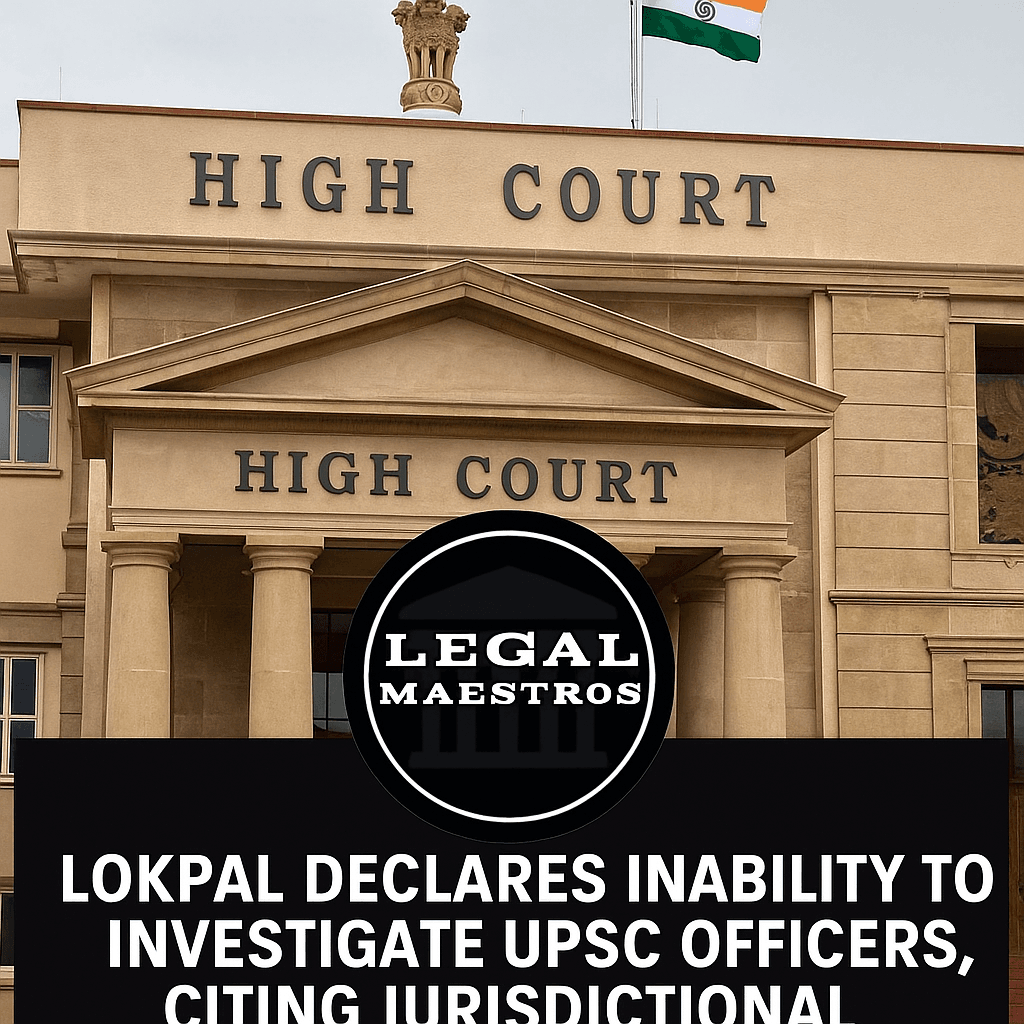
Lokpal Declares Inability to Investigate UPSC Officers, Citing Jurisdictional Limitations
Lokpal’s Limited Reach and the Constitutional Wall
The Lokpal is an anti-corruption ombudsman of India and was established with a noble intention of eliminating corruption amongst the public officials. Its authority, however, has just come to a wall in its constitutional power. The Lokpal has given a statement saying that it cannot probe into the officers of the Union Public Service Commission (UPSC) due to serious jurisdiction restrictions. This ruling brings to focus an important element in the legal and institutional context of the country, where the power of a statutory institution such as the Lokpal is subservient to a constitutional institution such as the UPSC. The decision can be explained by the very difference in the way the two institutions were set up.
Understanding the Jurisdictional Divide
The area of jurisdiction is not just a loophole in the law, but an intentional aspect of the law. The power of the Lokpal is defined by the Lokpal and Lokayuktas Act of 2013 that gives the Lokpal the right to enquire into corruption claims against a broad scope of government officials, including ministers, parliament members, and officials in the central government. The jurisdiction of the Lokpal is however limited to the public servants who are appointed or regulated by the government in an Act of Parliament. It is at this point where the case of UPSC comes into play. Instead, the UPSC is a constitutional institution that is set up, under Article 315 of the Constitution of India. It derives its powers and even its existence out of the constitution rather than out of a Parliamentary law. This constitutional position gives them a shield and the officers of the UPSC are out of investigative scope of the Lokpal today.
The UPSC: A Constitutional Fortress
A source of strength in the India civil services is the Union Public Service Commission (UPSC). Its main task is to carry out the exams and interviews in order to hire officers into the All India Services and Central Services. The work of the UPSC is to provide a fair, transparent, and merit-based selection process, not based on political influence and favors. The constitution gives the UPSC a lot of independence to ensure that it is not biased. This independence goes a notch higher in its internal management and the behavior of its members. This constitutional independence is upheld by the ruling of the Lokpal where it was seen that a statutory body cannot override the power of the body that is entrenched in the constitution itself.
For any queries or to publish an article or post or advertisement on our platform, do call at +91 6377460764 or email us at contact@legalmaestros.com.
A Look into Lokpal’s Mandate
The Lokpal was an outcome of a general anti-corruption movement that gripped the imagination of the nation. It was created to serve as a watchdog, an independent agency which could probe into corruption without the interference of politics. It has the mandate to investigate cases of corruption by the public functionaries and advise that they be prosecuted. The Lokpal is given the jurisdiction of a civil court and is able to direct cases to investigative organizations such as the Central Bureau of Investigation (CBI). Nonetheless, the latest decision on the UPSC officers demonstrates that despite the powerful mandate, the authority of the Lokpal is not absolute and it remains dependent on the constitutional framework of the state.
Navigating the Path Forward
The fact that the Lokpal has not been able to probe into the workings of the officers of the UPSC does not automatically imply that such officers will not be subject to any scrutiny whatsoever. Other anti-corruption laws and institutional mechanisms continue to be applied to them. The decision, nevertheless, demonstrates that there is an important loophole in the Lokpal Act which could be resolved with the help of several legislative changes. An amendment to the Lokpal and Lokayuktas Act would perhaps be required to give the Lokpal the power to intervene in constitutional organizations. Alternatively, the Lokpal may be obligated through a constitutional amendment to directly have the authority to probe such agencies as the UPSC. This legality provides an insight into the fine line between the various institutions within a democratic system and how the challenge of dealing with corruption requires a holistic approach without interfering with the constitutional framework. The situation at hand raises a national debate on whether the powers of the Lokpal should be increased and in case increased how this can be done without compromising the constitutional sanctity of the rest of the bodies.



![JOB POST: Junior Associate at ASM Law Chambers, Jaipur [Freshers]](https://legalmaestros.com/wp-content/uploads/2025/11/Gemini_Generated_Image_8wrxer8wrxer8wrx-768x708.png)

